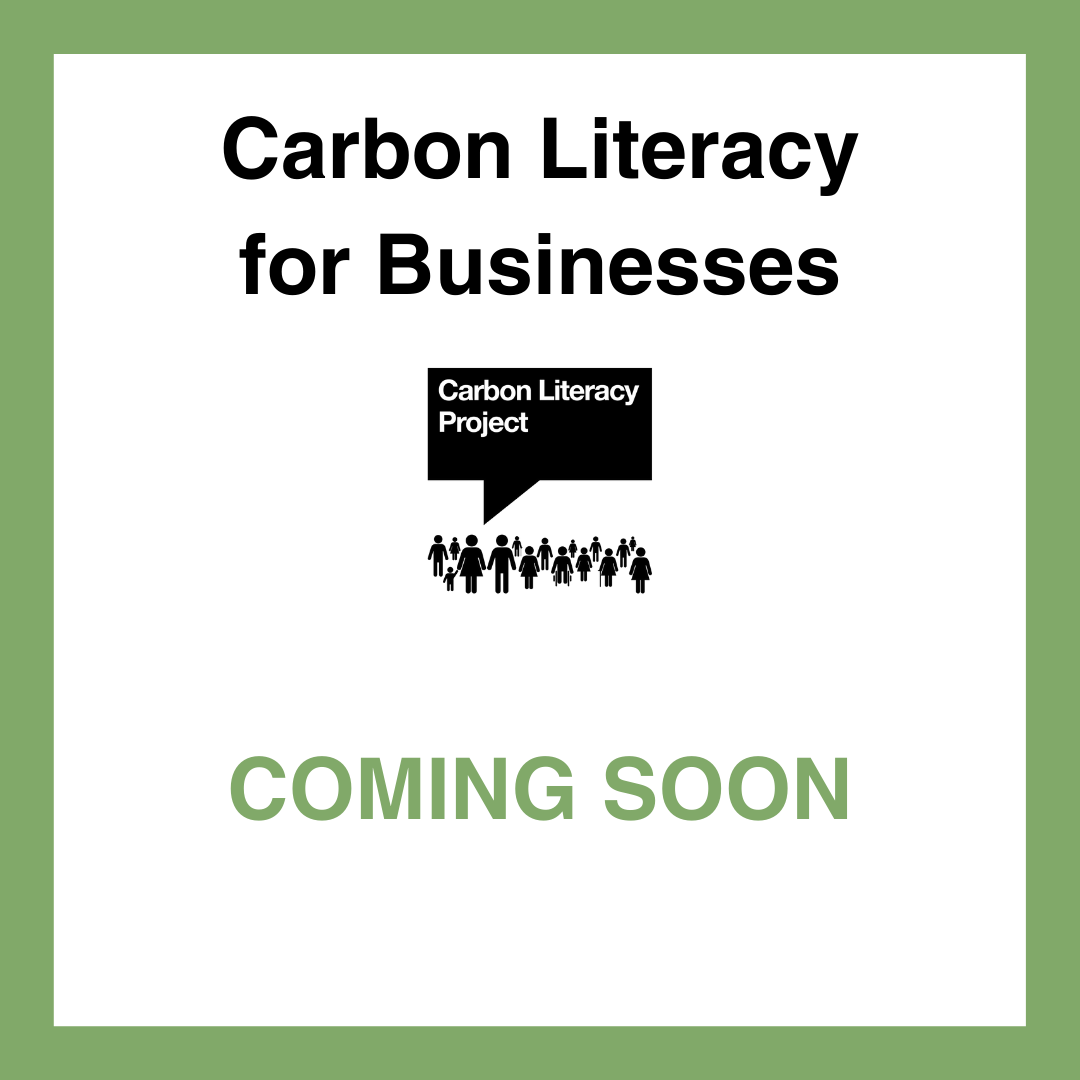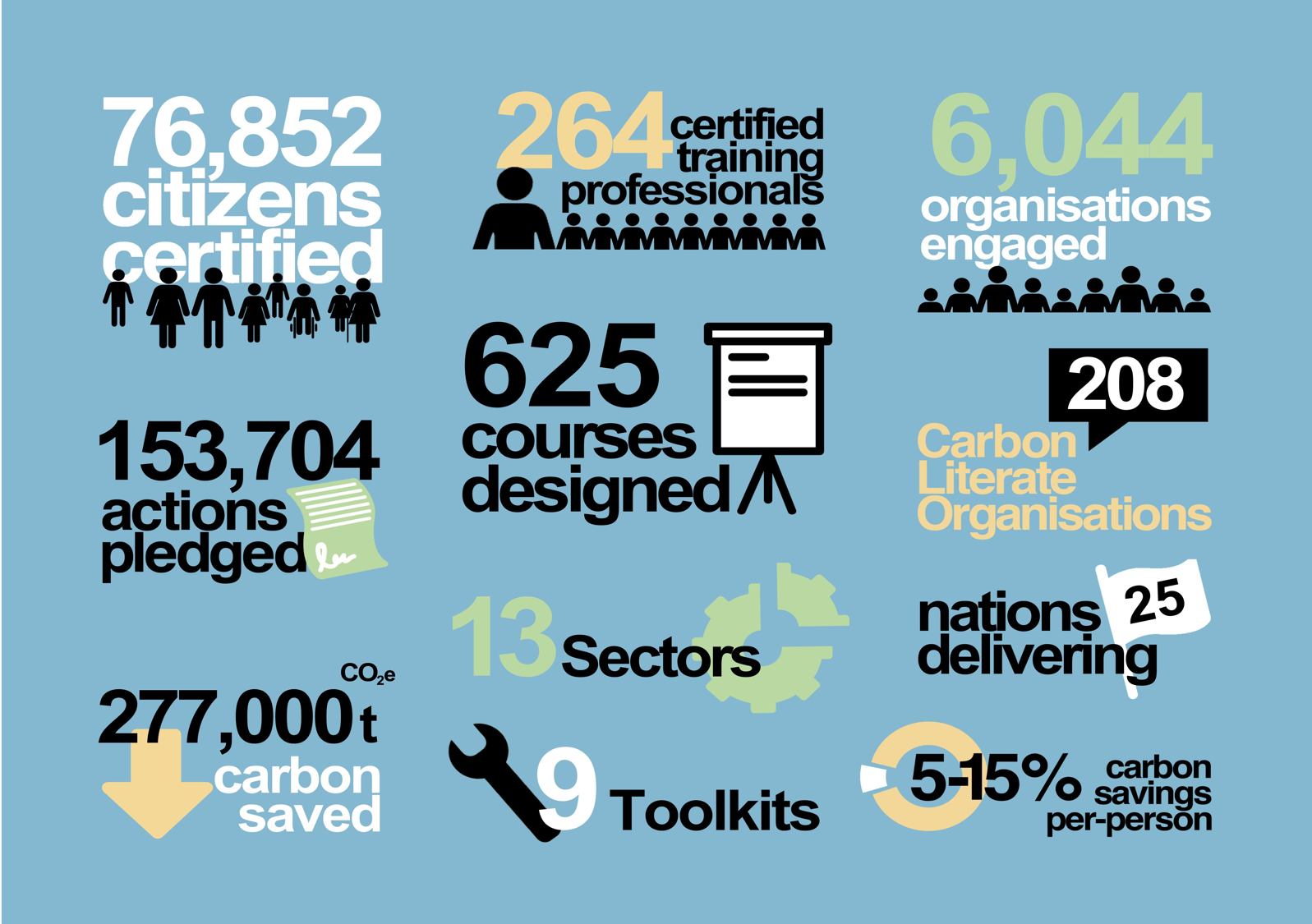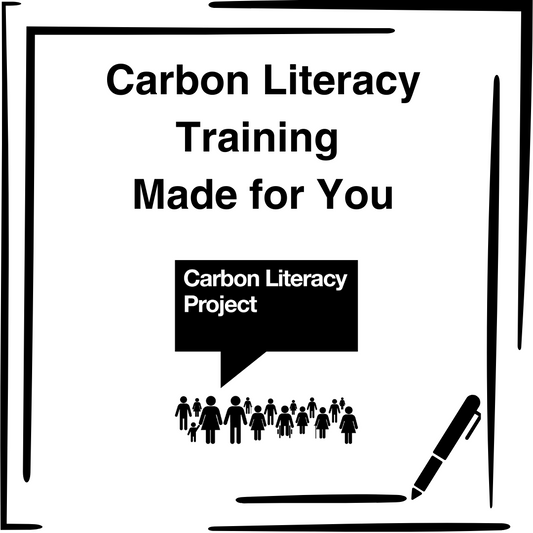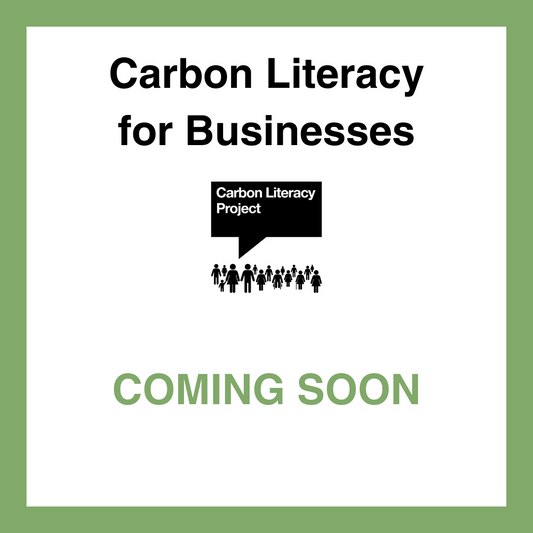Purposeful Innovators
CLP Carbon Literacy for Businesses - Coming Soon
CLP Carbon Literacy for Businesses - Coming Soon
Couldn't load pickup availability
The Carbon Literacy Project offers everyone a day’s worth of Carbon Literacy® learning, covering – climate change, carbon footprints, how you can do your bit, and why it’s relevant to you and your audience.
This training will help you understand the science behind climate change, the concept of climate justice, what can be done about the issues through individual and social action, and how to talk to others about the issues. Participants will be able to plan and implement solutions in the workplace and at home to address the most critical issue facing the world in the 21st century.
Delivered as a one-day in-person workshop or over two half-day sessions online, on successful submission and approval that your action plan meets the Carbon Literacy Standard, you will receive your certification.
Audience
These training materials have been designed to be as accessible and engaging for any staff in all types of organisations.
Content
The training materials consist of a variety of interactive and engaging activities which inform learners of climate change and their role within it. The sessions are structured into 6 one-hour-long modules, with self-directed study elements, which can be delivered online, face-to-face or as a combination.
Authors
Content is based on the course created by certified Carbon Literacy Consultants, Rachel Dunk & Jane Mörk, Manchester Metropolitan University.
Benefits of Attending a Carbon Literacy Course
Carbon literacy training can help you make a positive impact on the environment and within your community. It can also lead to personal and professional benefits, such as improving your decision-making skills and increasing your confidence in communicating about environmental issues.
- Increased awareness of the impact of carbon emissions on the environment.
- A better understanding of how individual actions can reduce carbon emissions.
- Improved ability to make informed decisions about carbon-reducing practices.
- Improved ability to communicate about climate change and carbon reduction.
- Potential to reduce carbon footprint and your energy bills!
- Improved ability to identify and implement sustainable practices in the workplace
- Increased engagement with environmental issues that affect you.
- Development of skills to influence others to reduce their carbon footprint.
- Increased understanding of how climate change affects global economies and society.
- Greater sense of responsibility for the environment and future generations.
Course Summary
| Training Lead | Rania Laing |
| Number of Days | 1 day (or two 0.5 days) |
| Level |
Beginner/Basics |
| Method | In-Person or Online |
| Location | Dubai, UAE or London, UK |
| Minimum Number of Participants | 6 |
About the Carbon Literacy Project
The Carbon Literacy Project offers everyone a day’s worth of Carbon Literacy® learning, covering – climate change, carbon footprints, how you can do your bit, and why it’s relevant to you and your audience.
The Carbon Literacy Project is globally unique – there is nothing else quite like it anywhere. It was recognised as such by the UN at COP21, in Paris, where it was awarded as a TAP100, one of 100 worldwide Transformative Action Programs.
Carbon Literacy (CL) is aimed at three distinct audiences – Those that live, Those that work, and, Those that study. This allows us to capture all audiences in our aim to offer every citizen Carbon Literacy learning.
Share


Infographic Descriptions
Citizens Certified
The total number of individuals that have successfully completed their day’s worth of Carbon Literacy learning – gaining their uniquely numbered CL certification.
Actions Pledged
Each learner must pledge two significant actions – one they can take on their own and one that they will do with a wider group of people – to gain their Carbon Literacy certification. This is why the number of actions pledged is always double the number of certified citizens.
In reality, many learners pledge more than two actions, but for ease of reporting, we only count two per individual.
Carbon Saved
Learners provide evidence of the carbon saving of the actions they’ve pledged – whether it saves 10’s, 100’s or 1000’s of kg of CO2e. The Carbon Literacy project (CLP) have taken an average of this data, which they’ve collated from over 12,000 of learners, and extrapolated that to cover the actions pledged by all certified learners. This figure is their best guess but likely a gross underestimate.
The CLP expect the real figure to be much higher than this due to:
- their requirement that actions pledged must be ‘significant’
- multiple actions often being pledged by learners for both the individual and group actions
- a focus on actions being pledged in the sphere the training takes place (often the workplace – where there is the opportunity to influence much greater carbon savings than an individual could in their personal life)
- where more than one of the ’10’s, 100’s, and 1000’s’ is selected, we record the lowest selected
- a number of really high impact actions that we are aware of that are in themselves many thousands of tonnes
- all the additional actions that learners go on to take, over and above their pledged actions, as a result of their newfound knowledge and skills
As such, a more material study looking into the attribution of the carbon saving of actions pledged as part of Carbon Literacy training is something they would love to undertake. If you feel you’d be able to help them with this research piece to quantify Carbon Literacy’s impact, please Contact Us
Previous research on Carbon Literacy.
For reference: the current average carbon footprint of a UK citizen is 12.7 tonnes CO2e.
Certified Training Professionals
The total number of certified Carbon Literacy Training Professionals.
Courses Designed
The total number of accredited Carbon Literacy courses.
These training materials have been through the CLP's rigorous criteria checker process and have been deemed to fulfil the requirements of the Carbon Literacy Standard.
Sectors
A ‘sector’ is officially counted when it reaches a critical mass in one of two ways:
- A recognised sectoral network or professional body adopts and implements a Carbon Literacy course with multiple organisations within the sector.
- There are multiple organisations collaborating to adopt and implement Carbon Literacy within their organisations and across the wider sector.
Toolkits
The number of sectors in which a Carbon LiteracyToolkit has been launched.
Organisations Engaged
The number of organisations with Carbon Literacy certified people.
Carbon Literate Organisations
The total number of organisations that have gained Carbon Literate Organisation (CLO) accreditation.
This is based on organisations achieving the introductory level – Bronze – and takes into account any historical accreditations.
The CLP regularly update a list of the current CLO accreditation holders.
Nations Delivering
Nations where an accredited programme of Carbon Literacy training has been developed and delivered.
The nations included are:
- Antarctica
- Australia
- Austria
- Belgium
- Bolivia
- Canada
- Croatia
- Denmark
- England
- France
- Germany
- Guatemala
- Guernsey
- Hong Kong SAR
- Italy
- Jersey
- Kenya
- Mexico
- Northern Ireland
- Saudi Arabia
- Scotland
- Sweden
- The Netherlands
- United States of America
- Wales
Carbon Saving Per Person
Jacobs UK has found savings of between 5% and 15% to be regularly demonstrated on similar behavioural approaches to Carbon Literacy. The key to all of this is to make sure the approach to governance (accountability, monitoring/reporting systems, regularity to the comms/training) is also addressed to back up and validate behaviour changes (which is done through the Carbon Literate Organisation accreditation). That way the savings are sustained and are not just a short-lived positive change that is lost over time.
“A construction company rolled out an engagement and behaviour change pilot at their head office which achieved a 15% saving in electricity consumption, which was sustained over the subsequent year of monitoring as a result of supporting procedure and systems changes and an ongoing approach to communications. The company went on to roll the approach out at other sites, led by nominated ‘young leaders’ who were coached in delivering the same approach at their home site. These sites – which included offices, depots and combined sites – achieved between 5% and 12% reduction in electricity consumption over the subsequent 3 month period compared with the previous year.”
“The national low carbon schools programme delivered by Jacobs on behalf of the Carbon Trust demonstrated that it is possible to achieve cost and carbon savings of over 10% and in some cases as high as 20%, just through simple no and very low-cost interventions which are engagement-led and promote positive environmental behaviour, and can be supported by everyone in the school.”
Explore More
-
CLP Carbon Literacy Training Made For You
Vendor:Purposeful InnovatorsRegular price $7,000.00Regular priceUnit price / per -
CLP Carbon Literacy for Events - Coming Soon
Vendor:Purposeful InnovatorsRegular price From $195.00Regular priceUnit price / per -
CLP Carbon Literacy for Businesses - Coming Soon
Vendor:Purposeful InnovatorsRegular price From $195.00Regular priceUnit price / per -
CLP Carbon Literacy for Sports Course ID: CC000359
Vendor:Purposeful InnovatorsRegular price From $195.00Regular priceUnit price / per





